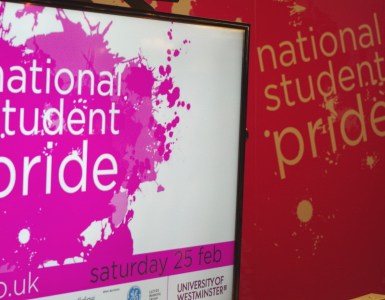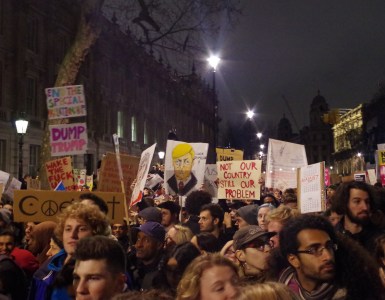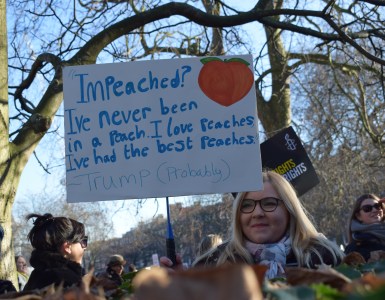It’s a hazy evening in May, and Sorana Vieru is finishing up at the National Union of Students (NUS) offices on Gray’s Inn Road. “I normally work late,” she tells me breezily, wishing goodbye to the only two staffers left in the building, and the cleaners who’ve lent her a key.
“It is very demanding, it involves a lot of travel and not being at home, which does impact on your work-life balance massively,” she confides. “But I ultimately love my job so much.”
Over the past two months things have been especially challenging for the freshly re-elected officer; the new higher education bill is making its way through Parliament, and as NUS vice president for higher education (VPHE), it’s Sorana’s job to lobby against it.
At the same time, NUS has found itself in a different fight as disaffiliation referenda are testing the union’s relationship with students and their campuses. In the first tranche before the summer holidays, four students’ unions have left, eleven have remained.
“We’ve never seen that many referenda triggered at the same time,” she tells me, as we sit down to tea – English breakfast – at a greasy spoon just up the road. “It became bigger news because we elected our first Black Muslim woman president of NUS, so I think there’s a lot down to the coverage in the media, which was heavily manipulated, actively promoting falsehoods we’ve tried to settle straight from the start.”
We’ll talk for two hours, as punters and wayward travellers come and go around us, after cheap coffee and somewhere quiet to sit away from the bustle of the train stations nearby. A few of them noticeably turn their heads when they overhear us talking politics.
Sorana backed Malia Bouattia for NUS president, the controversial candidate who won despite allegations that remarks made toward Birmingham University in 2011, also Sorana’s alma mater, were anti-semitic. Malia, a long-time Palestinian solidarity campaigner, stood her ground citing differences between anti-zionism and anti-semitism.
The hope for left-wing officers like Sorana is that Malia’s radicalism, while perhaps alienating those who have voted to leave NUS, will still galvanise others who long wanted it to take a stronger line opposing the government and demanding an end to tuition fees.
“Malia was a clear change in the discourse around reviving grassroots campaigning and taking stances,” Sorana claims, clearly passionate about the potential. “But I think there’s a lot of speculation around how this would harm our relationships with the sector – which I think are unfounded.”
Free education protesters march past Parliament last November
She’ll have to exploit those relationships as the higher education bill heads for its second reading. A complex shake-up is planned, including maximum tuition fees being pegged to inflation based on university performance, the chance for new ‘private’ institutions to be set up, and the creation of an ‘Office for Students’ to oversee the whole sector.
Her own experience of university is studying philosophy in Russell Group, first at Birmingham, then a Masters and a PhD at the University of Bristol. She paused her PhD in order to pursue student politics and hasn’t looked back.
“I wouldn’t mind a provider closing down if it didn’t have any students,” she thunders, without much prompting. “It’s an experiment: let’s see if the incumbents up their game in the face of competition, and yeah never mind the students, who would be at risk of their provider closing down.”
Supposedly, under the bill, none of these old reliable institutions are likely to shut down before 2025 - though Sorana does warn that small and specialist institutions are most at risk, which poses a particular threat to London universities.
She thinks that Jo Johnson won an argument, within government circles, that David Cameron’s widening participation targets - a key part of his ‘compassionate conservatism’ programme - could only be met by ‘opening up’ the universities ‘market’ to private institutions.
A slightly European, deeper accent and bright red politics betray her heritage: her mother is a flight attendant and Romanian trade union leader, although her father is, in her own words, ‘a capitalist’.
“He’d call me a trot. I’m a communist so we have like a weird dynamic, but I’ve always had politics around the house. My Nan kept a little drawing of mine - there’s a piece of paper where I designed my own party, it’s like ‘Sorana Socialist Party,’ and really broken handwriting, and the logo is like one rose as well,” she catches my raised eyebrows. “I know… In hindsight now I’m so predictable.”
With her parents still in Romania she’s got more reason than most to care about the upcoming EU referendum.
“I don’t think the EU is ideal… there’s a lot to be changed about it, it’s like any membership organisation!” she laughs, then pulls a serious face. “Not only does leaving pose extra impediments on EU students and international students, but universities get a lot of money for research from European Union grants and partnerships with institutions across Europe, which are made easier by membership to the EU.”
Register to Vote before the 7th JuneStudents, young people - the EU Referendum could be decided by you.
Register now: http://bit.ly/1VBbQPhPosted by National Union of Students on Friday, June 3, 2016
Pro-remain NUS video
There’s perhaps a fear, too, that if Britain leaves the EU, the current universities minister won’t just government consent to help convert the universities sector into more of a market, but he’ll have his brother, Boris, in Downing Street to give him the resources to do it.
“I think Jo Johnson’s intentions to leave his mark, and have a legacy project with the teaching excellence framework (TEF), were quite transparent from the beginning.” Sorana says. “The intentions were fairly clear around embedding marketization further in the sector and almost pushing it on institutions, to enforce competition, pitting institutions against each other.”
The TEF is to function a bit like Ofsted does with schools, producing a league table of teaching quality and helping decide which universities are allowed to raise their fees. Rising fees will only be capped to inflation - for now.
NUS are hoping for an about-turn from universities. If she can prove to them, Sorana tells me, that TEF would be bad overall for vice-chancellors, they might be willing to oppose the framework altogether. The union, for its part, has recommended students sabotage the National Student Survey, one of the indicators that will affect overall TEF score.
She gestures as if posing a question: “I’ve often called the TEF the strangest thing I’ve seen because you can see TEF in communism probably, and a communist higher education system, and metrics, and performance management and so on,”
Complex mechanism: Universities Minister Jo Johnson has been championing the Teaching Excellence Framework.
Sorana is repeating a common criticism that with a powerful ‘Office for Students’ overseeing the new excellence ‘market,’ it could actually be some of the most penetrating state involvement ever seen in UK universities.
“I’m not sure I want to be an academic any more - or at least, not in the UK.”
“Because the direction Higher Education is currently going in; because of the very intense competition and very precarious life that early career academics and researchers have to live, because you have to teach at several universities to scrape together a wage, because of intense competition in the Arts & Humanities, because there’s not as much funding as opposed to STEM subjects, I’m not sure it’s something I want to go through right now.”
This fight then, like the EU referendum, isn’t just theoretical: for Sorana, opposing the first higher education bill for a decade is a personal one.
Throughout our conversation though, she’s keen to impress on me the importance of consulting with unions and sabbs who form the membership of NUS - she liaises with them daily and tries to visit campuses two to three times a week. It was a key manifesto pledge for her election, though arguably also a good chance to go out and meet future potential electors.
She tell me she hopes that her role has been made a bit less technical and injected with a bit more energy - and boasts about her ‘ninja packing skills,’ packing for three to four days in ten minutes.
At Bristol, Sorana first got into student politics after arguing for the creation of a new postgraduate officer position. In that role she started attending NUS events and ended up wanting to run for a national position.
“I felt I could play a role in mobilising students to effect change in academic communities, not just the funding system and governmental decisions about HE, but about how academia itself works: challenging the power structures in academic communities.”
Sorana should, in theory, be happy that a key NUS demand - access and participation agreements to improve access to universities for disadvantaged groups - made it into the HE bill.
However, the agreements have been bound to the new fees system.
“There’s a bit of disingenuity from the government because, on the one hand, you talk about access and participation in higher education.”
“On the other hand, you plan to raise tuition fees, you scrap maintenance grants, you scrap NHS bursaries and halve the student opportunities fund that you give to HEFCE. So the way they conceive of access is not actually understanding the lived experience and the huge debt that those students would be taking on.”
Sorana clearly starts flagging towards the end of the interview, which is fair enough since it’s almost nine o’clock; but she’s still more lucid than most politicians and more relaxed than an awful lot of NUS hacks.
I did ask her if she was worried whether the pressure of all the millions of students she works for, present and future, ever gets to her.
“I’m not going to lie I’m anxious, and I’m scared… but also it’s a great position to be in,” she hesitates here, clearly concerned that what she’s said could get taken the wrong way. “Sadly, there’s bad stuff going on, but what we’re doing is good and NUS is relevant. It does good things for students and it aims to do good things for students.”
“It’s an historic year to be VPHE.”








[…] READ: Exclusive interview with Sorana Vieru, the NUS officer fighting the HE bill […]